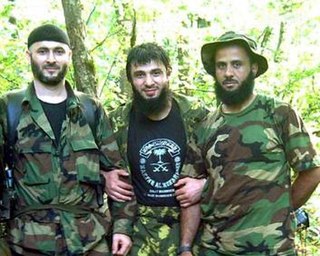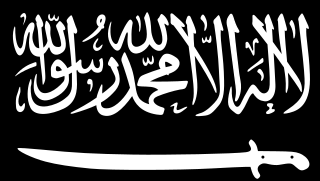Related Research Articles

The Second Chechen War took place in Chechnya and the border regions of the North Caucasus between the Russian Federation and the Chechen Republic of Ichkeria, from August 1999 to April 2009. In August 1999, Islamist fighters from Chechnya infiltrated Russia's Dagestan region, declaring it an independent state and calling for holy war. During the initial campaign, Russian military and pro-Russian Chechen paramilitary forces faced Chechen separatists in open combat and seized the Chechen capital Grozny after a winter siege that lasted from December 1999 until February 2000. Russia established direct rule over Chechnya in May 2000 although Chechen militant resistance throughout the North Caucasus region continued to inflict heavy Russian casualties and challenge Russian political control over Chechnya for several years. Both sides carried out attacks against civilians. These attacks drew international condemnation.

Rasul Makasharipov, nicknamed Muslim and also known as Emir Rasul, was a Dagestani Islamist leader in southern Russia. He was the founder of the militant group Dzhennet and later created the rebel group Shariat Jamaat, which sought to unite Caucasian Muslims under Islamic rule and later became part of the Caucasian Front.

The Dagestan War, also known as the Invasion of Militants in Dagestan began when the Chechnya-based Islamic International Peacekeeping Brigade (IIPB), an Islamist group, led by Shamil Basayev, Ibn al-Khattab, Ramzan Akhmadov and Arbi Barayev, invaded the neighboring Russian republic of Dagestan, on 7 August 1999, in support of the Shura of Dagestan separatist rebels. The war ended with a major victory for the Russian Federation and Dagestan Republic, and the retreat of the IIPB. The invasion of Dagestan served as the main casus belli alongside the series of apartment bombings in September 1999 for the Second Chechen War.
In June 2000, the North Caucasian Chechen separatist-led Chechen insurgents added suicide bombing to their tactics in their struggle against Russia. Since then, there have been dozens of suicide attacks within and outside the republic of Chechnya, resulting in thousands of casualties among Russian security personnel and civilians. The profiles of the suicide bombers have varied, as have the circumstances surrounding the bombings.
The Kizlyar–Pervomayskoye hostage crisis, also known in Russia as the terrorist act in Kizlyar, occurred in January 1996 during the First Chechen War. What began as a raid by Chechen separatist forces led by Salman Raduyev against a federal military airbase near Kizlyar, Dagestan, became a hostage crisis involving thousands of civilians, most of whom were quickly released. It culminated in a battle between the Chechens and Russian special forces in the village of Pervomayskoye, which was destroyed by Russian artillery fire. Although the Chechens escaped from the siege with some of their hostages, at least 26 hostages and more than 200 combatants on both sides died. One third of the homes in Pervomayskoye were destroyed.

Rappani Khalilov, also known as Rabbani, was the militant leader of the Shariat Jamaat of the Caucasian Front during the Second Chechen War, in the volatile southern Russian republic of Dagestan. He was killed on September 17, 2007 in a fierce shoot-out with the Russian special forces.

Vilayat Dagestan, formerly known as Shariat Jamaat, was an Islamist Jihadist group based in the Russian republic of Dagestan and is part of the Caucasus Emirate. The group is closely associated with the separatist conflicts in the nearby Russian republics of Chechnya and Ingushetia, and was created during the Second Chechen War in favor of Dagestan's independence as an Islamic state.

The insurgency in the North Caucasus was a low-level armed conflict between Russia and militants associated with the Caucasus Emirate and, from June 2015, Islamic State of Iraq and the Levant (ISIL) groups in the North Caucasus. It followed the official end of the decade-long Second Chechen War on 16 April 2009. It attracted people from the Middle East, North Africa, Europe, and Central Asia, who then participated in the conflict, but volunteers from the North Caucasus were also fighting in Syria.

The Islamic State – Caucasus Province was a branch of the militant Islamist group Islamic State (IS), that was active in the North Caucasus region of Russia. IS announced the group's formation on 23 June 2015 and appointed Rustam Asildarov as its leader. It was destroyed by 2017, although some lone wolves acted on behalf of the Caucasus Province for several years afterwards.
References
- ↑ Independent Newspapers Online. "Troops kill Chechen rebels in firefight". Independent Online. Retrieved 14 December 2014.
- ↑ "Programs - The Jamestown Foundation" . Retrieved 14 December 2014.
- 1 2 3 "Terrorism Monitor - The Jamestown Foundation" . Retrieved 14 December 2014.
- ↑ "Eurasia Daily Monitor - The Jamestown Foundation" . Retrieved 14 December 2014.
- ↑ "Terrorism Monitor - The Jamestown Foundation" . Retrieved 14 December 2014.
- ↑ "BBC NEWS - Europe - Chechen leader Maskhadov killed" . Retrieved 14 December 2014.
- ↑ "Programs - The Jamestown Foundation" . Retrieved 14 December 2014.
- ↑ Russians killed in Chechen attack BBC News
- ↑ "People's Daily Online -- Six troops killed, at least 10 injured in Chechnya attack" . Retrieved 14 December 2014.
- ↑ Chechen Attack Kills at Least 5
- ↑ "Programs - The Jamestown Foundation" . Retrieved 14 December 2014.
- ↑ "Programs - The Jamestown Foundation" . Retrieved 14 December 2014.
- ↑ John Pike. "10 Servicemen Killed In Chechnya" . Retrieved 14 December 2014.
- ↑ John Pike. "Nine Russian Soldiers Reported Killed In Chechnya" . Retrieved 14 December 2014.
- ↑ "USATODAY.com - Five Russian soldiers killed in Chechnya" . Retrieved 14 December 2014.
- 1 2 3 CHECHEN FIGHTING CLAIMS MORE LIVES
- ↑ "Military truck explodes in Dagestan, Russia". 2 September 2005. Retrieved 14 December 2014.
- ↑ "3 policemen killed in Dagestan attack". Archived from the original on 2007-09-28. Retrieved 2007-09-06.
- ↑ "Eight Security Forces, Five Rebels Killed In Chechnya". RadioFreeEurope/RadioLiberty. Retrieved 14 December 2014.
- ↑ John Pike. "Six Police, Top Rebel Commander Killed In Chechnya" . Retrieved 14 December 2014.
- ↑ "Eurasia Daily Monitor - The Jamestown Foundation" . Retrieved 14 December 2014.
- ↑ ISN Editors. "Articles / Security Watch / ISN" . Retrieved 14 December 2014.
{{cite web}}:|author=has generic name (help) - ↑ "Nine Russian Soldiers Killed In Chechnya". RadioFreeEurope/RadioLiberty. Retrieved 14 December 2014.
- ↑ "Terrorism Monitor - The Jamestown Foundation" . Retrieved 14 December 2014.